初中英语七年级上册复习课件:Module 4 Unit8 Collecting things(共44张PPT)
文档属性
| 名称 | 初中英语七年级上册复习课件:Module 4 Unit8 Collecting things(共44张PPT) | 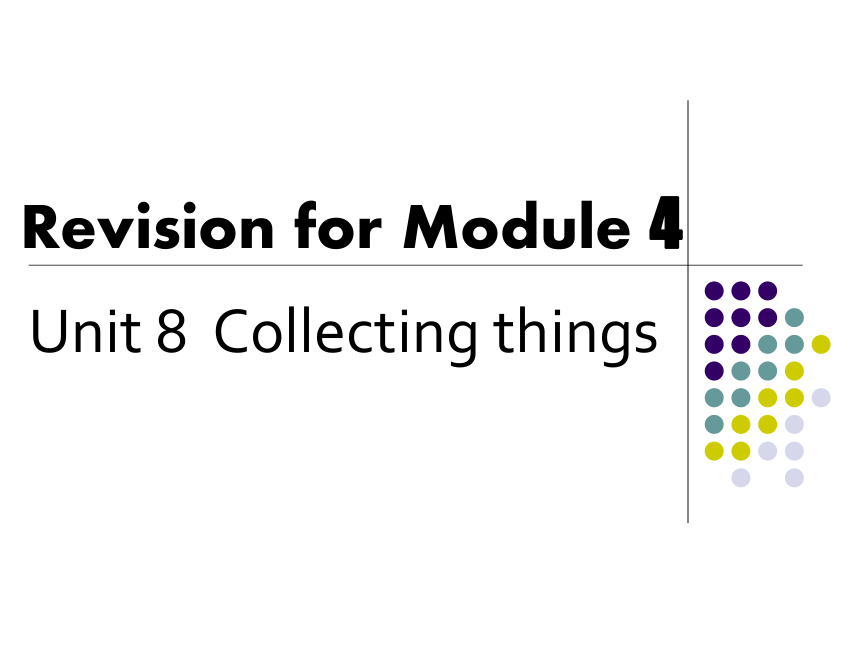 | |
| 格式 | zip | ||
| 文件大小 | 35.1KB | ||
| 资源类型 | 教案 | ||
| 版本资源 | 牛津沈阳版 | ||
| 科目 | 英语 | ||
| 更新时间 | 2015-12-29 22:52:34 | ||
图片预览

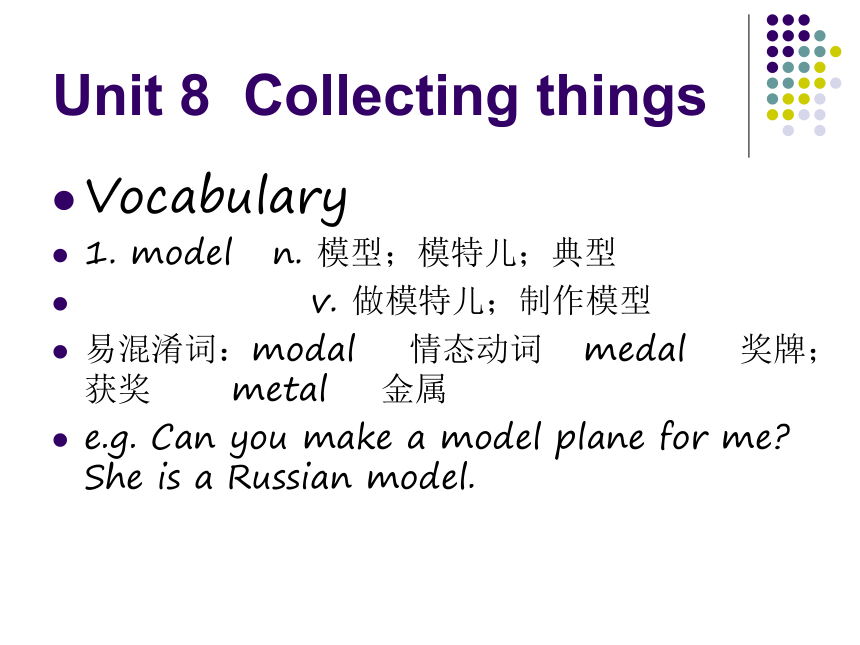
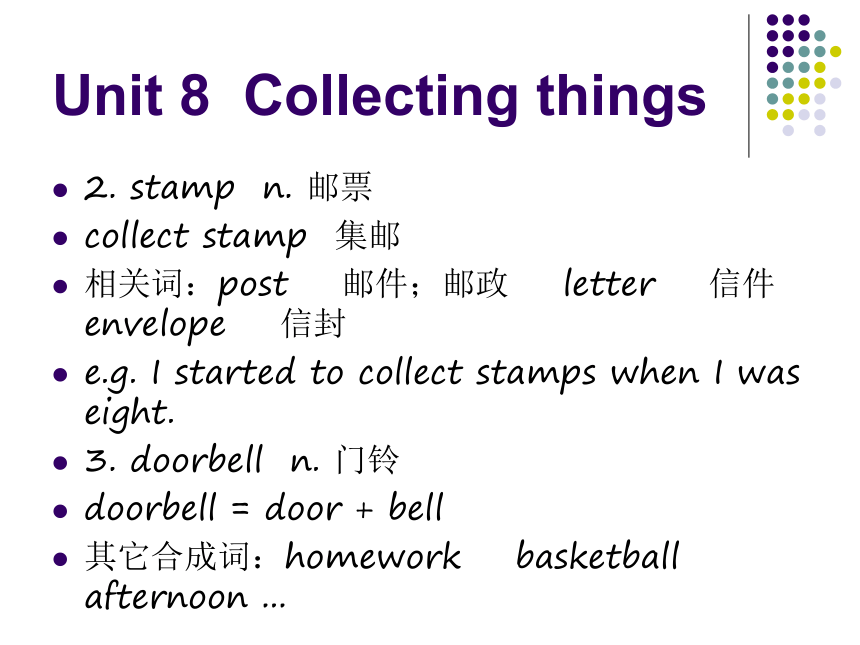
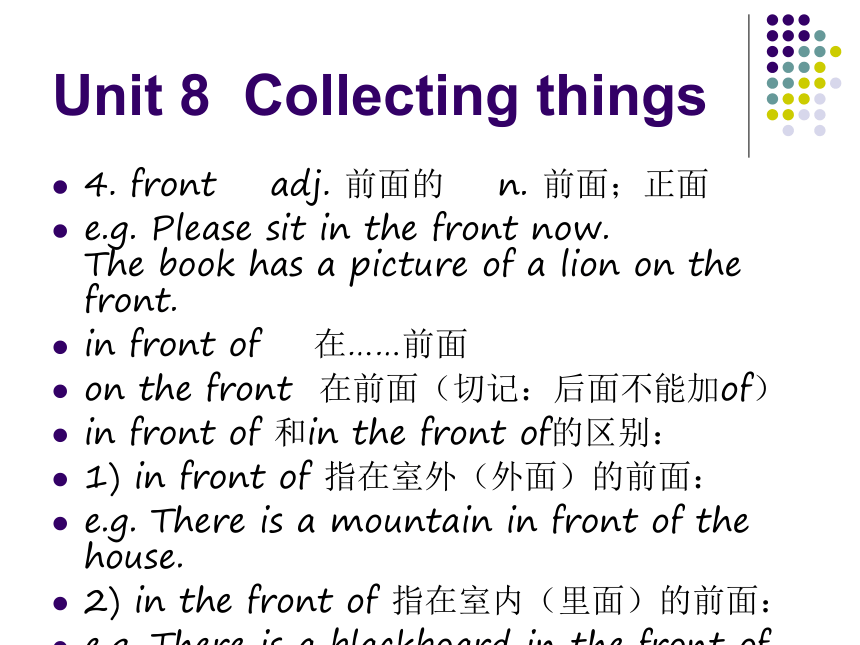
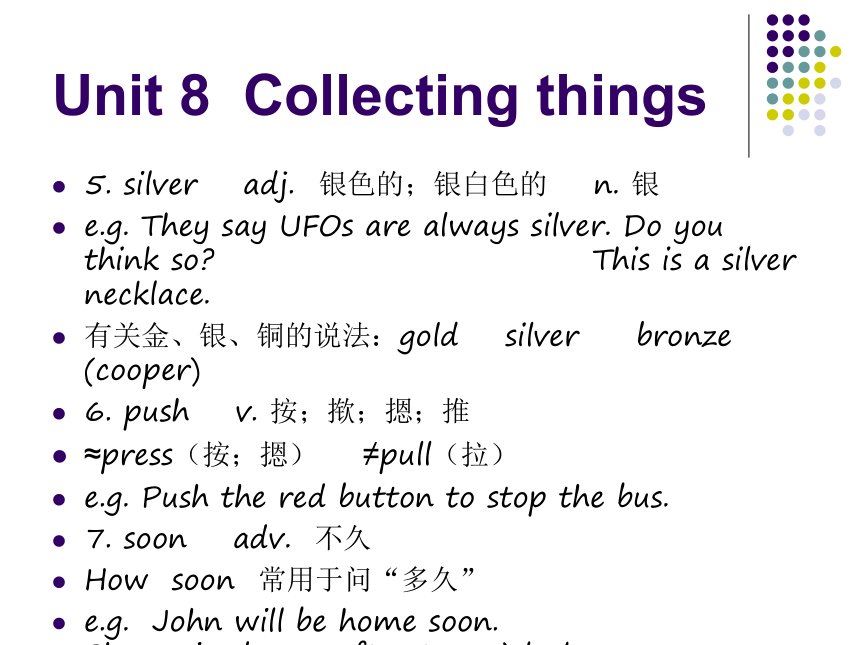
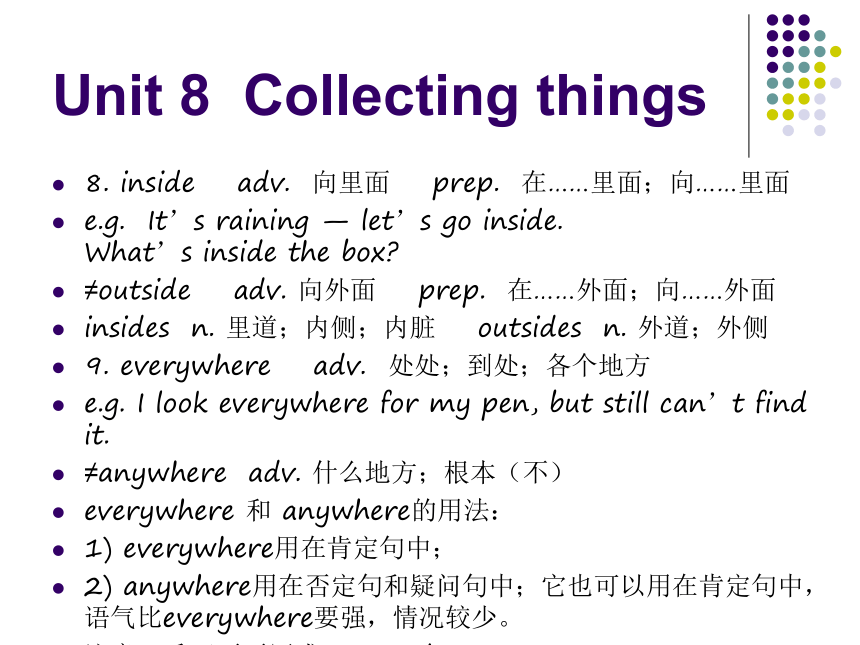
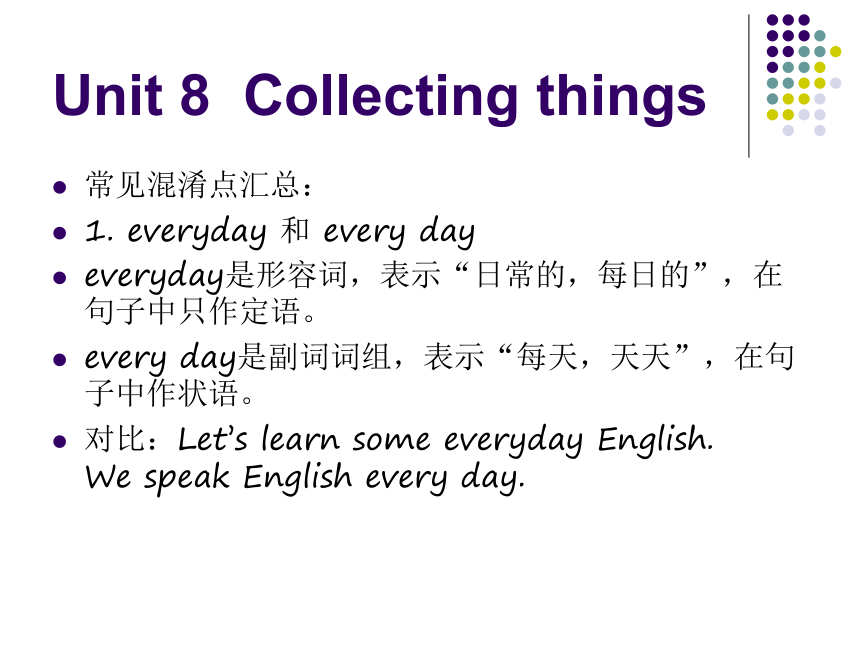
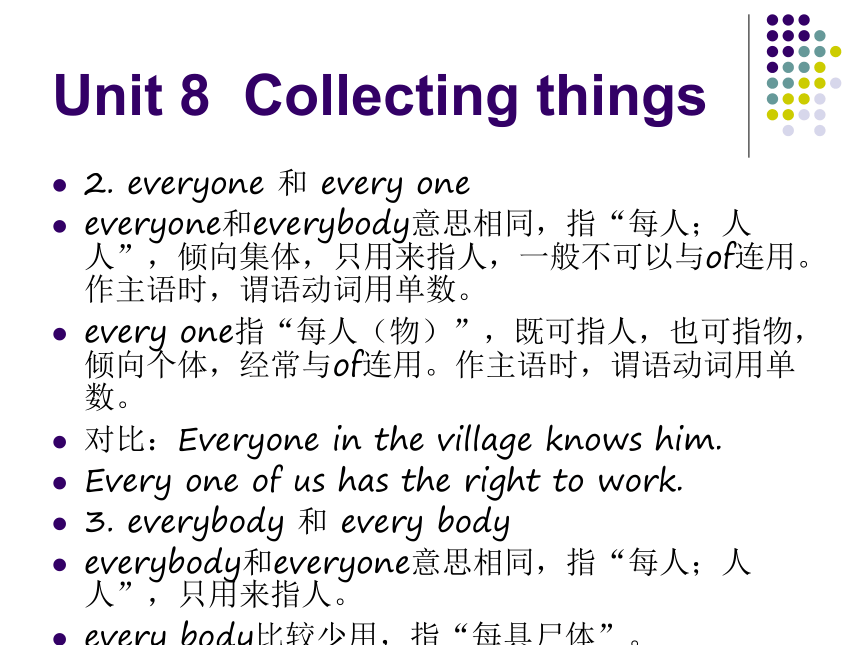
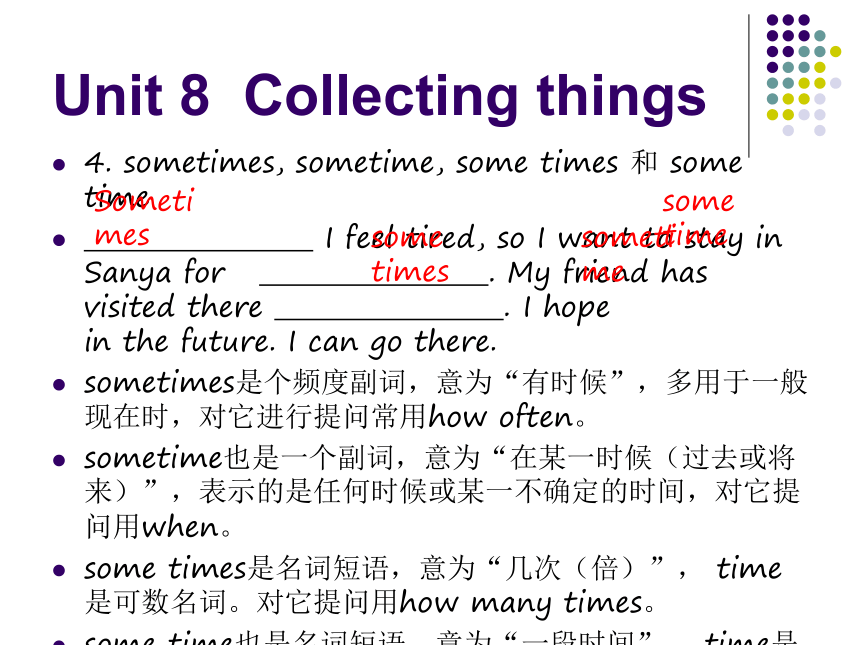
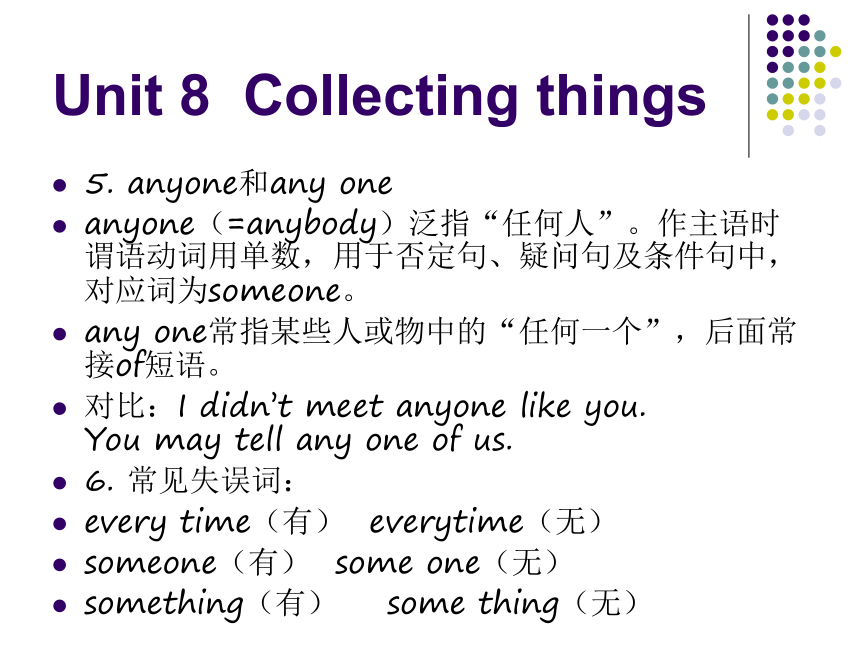
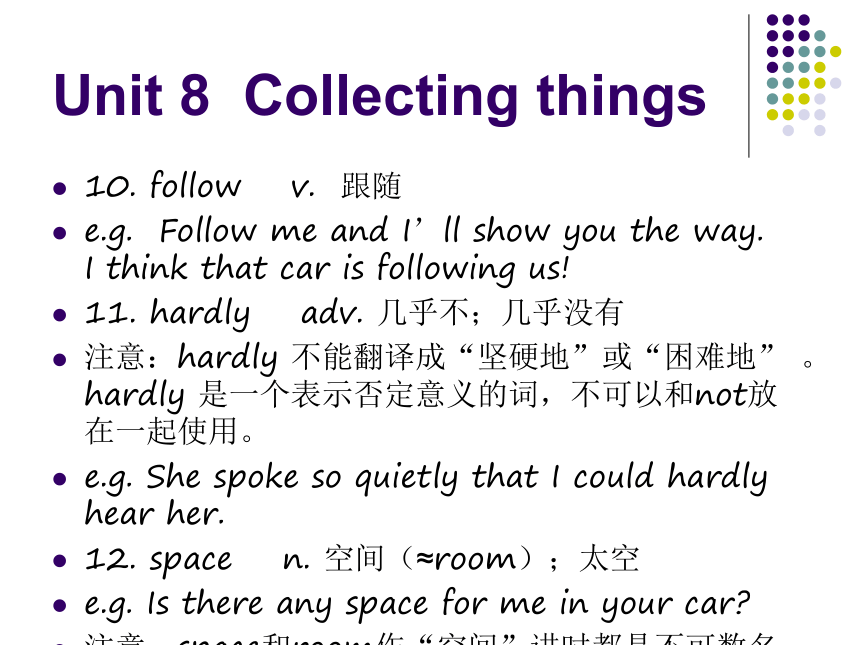
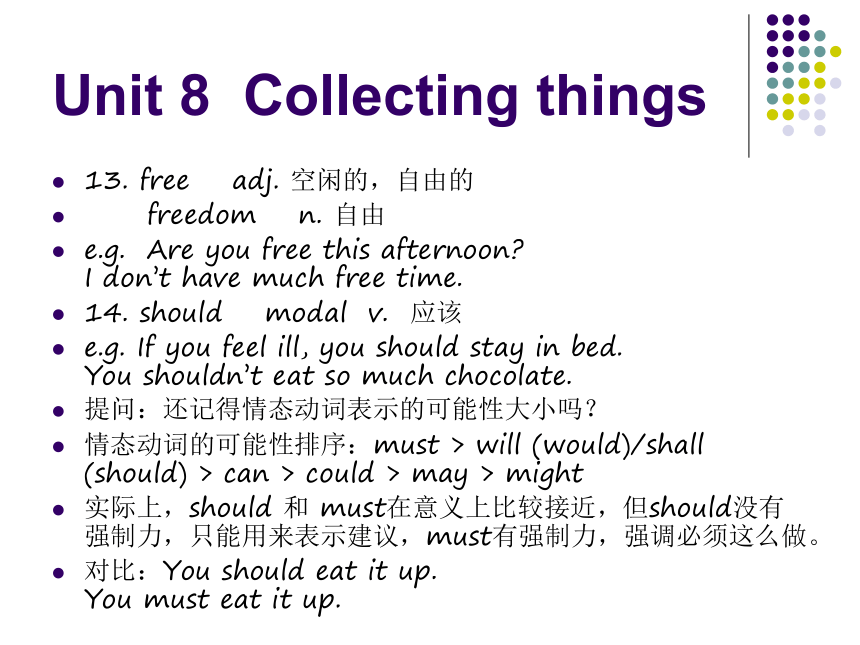
文档简介
课件44张PPT。Revision for Module 4Unit 8 Collecting thingsUnit 8 Collecting thingsVocabulary
1. model n. 模型;模特儿;典型
v. 做模特儿;制作模型
易混淆词:modal 情态动词 medal 奖牌;获奖 metal 金属
e.g. Can you make a model plane for me? She?is?a?Russian?model.
Unit 8 Collecting things2. stamp n. 邮票
collect stamp 集邮
相关词:post 邮件;邮政 letter 信件 envelope 信封
e.g. I started to collect stamps when I was eight.
3. doorbell n. 门铃
doorbell = door + bell
其它合成词:homework basketball afternoon ...
Unit 8 Collecting things4. front adj. 前面的 n. 前面;正面
e.g. Please sit in the front now. The book has a picture of a lion on the front.
in front of 在……前面
on the front 在前面(切记:后面不能加of)
in front of 和in the front of的区别:
1) in front of 指在室外(外面)的前面:
e.g. There is a mountain in front of the house.
2) in the front of 指在室内(里面)的前面:
e.g. There is a blackboard in the front of the classroom.
Unit 8 Collecting things5. silver adj. 银色的;银白色的 n. 银
e.g. They say UFOs are always silver. Do you think so? This is a silver necklace.
有关金、银、铜的说法:gold silver bronze (cooper)
6. push v. 按;揿;摁;推
≈press(按;摁) ≠pull(拉)
e.g. Push the red button to stop the bus.
7. soon adv. 不久
How soon 常用于问“多久”
e.g. John will be home soon. She arrived soon after two o’clock.Unit 8 Collecting things8. inside adv. 向里面 prep. 在……里面;向……里面
e.g. It’s raining — let’s go inside. What’s inside the box?
≠outside adv. 向外面 prep. 在……外面;向……外面
insides n. 里道;内侧;内脏 outsides n. 外道;外侧
9. everywhere adv. 处处;到处;各个地方
e.g. I look everywhere for my pen, but still can’t find it.
≠anywhere adv. 什么地方;根本(不)
everywhere 和 anywhere的用法:
1) everywhere用在肯定句中;
2) anywhere用在否定句和疑问句中;它也可以用在肯定句中,语气比everywhere要强,情况较少。
注意:千万不要写成every where。
Unit 8 Collecting things常见混淆点汇总:
1. everyday 和 every day
everyday是形容词,表示“日常的,每日的”,在句子中只作定语。
every day是副词词组,表示“每天,天天”,在句子中作状语。
对比:Let’s learn some everyday English. We speak English every day.
Unit 8 Collecting things2. everyone 和 every one
everyone和everybody意思相同,指“每人;人人”,倾向集体,只用来指人,一般不可以与of连用。作主语时,谓语动词用单数。
every one指“每人(物)”,既可指人,也可指物,倾向个体,经常与of连用。作主语时,谓语动词用单数。
对比:Everyone in the village knows him.
Every one of us has the right to work.
3. everybody 和 every body
everybody和everyone意思相同,指“每人;人人”,只用来指人。
every body比较少用,指“每具尸体”。Unit 8 Collecting things4. sometimes, sometime, some times 和 some time
I feel tired, so I want to stay in Sanya for . My friend has visited there . I hope in the future. I can go there.
sometimes是个频度副词,意为“有时候”,多用于一般现在时,对它进行提问常用how?often。
sometime也是一个副词,意为“在某一时候(过去或将来)”,表示的是任何时候或某一不确定的时间,对它提问用when。
some?times是名词短语,意为“几次(倍)”,?time是可数名词。对它提问用how?many?times。
some?time也是名词短语,意为“一段时间”,?time是不可数名词,对它提问用how?long。??
Sometimessome timesome timessometimeUnit 8 Collecting things5. anyone和any one
anyone(=anybody)泛指“任何人”。作主语时谓语动词用单数,用于否定句、疑问句及条件句中,对应词为someone。
any one常指某些人或物中的“任何一个”,后面常接of短语。
对比:I didn’t meet anyone like you. You may tell any one of us.
6. 常见失误词:
every time(有) everytime(无)
someone(有) some one(无)
something(有) some thing(无)Unit 8 Collecting things10. follow v. 跟随
e.g. Follow me and I’ll show you the way. I think that car is following us!
11. hardly adv. 几乎不;几乎没有
注意:hardly 不能翻译成“坚硬地”或“困难地” 。 hardly 是一个表示否定意义的词,不可以和not放在一起使用。
e.g. She spoke so quietly that I could hardly hear her.
12. space n. 空间(≈room);太空
e.g. Is there any space for me in your car?
注意:space和room作“空间”讲时都是不可数名词。Unit 8 Collecting things13. free adj. 空闲的,自由的
freedom n. 自由
e.g. Are you free this afternoon? I don’t have much free time.
14. should modal v. 应该
e.g. If you feel ill, you should stay in bed. You shouldn’t eat so much chocolate.
提问:还记得情态动词表示的可能性大小吗?
情态动词的可能性排序:must > will (would)/shall (should) > can > could > may > might
实际上,should 和 must在意义上比较接近,但should没有强制力,只能用来表示建议,must有强制力,强调必须这么做。
对比:You should eat it up. You must eat it up.Unit 8 Collecting things15. sentence n. 句子 v. 宣判,判决
e.g. You only need to write the letter with a few sentences. Anwar?faced?a?maximum?sentence?of?20?years?in?prison?if?convicted.
16. magazine n. 杂志
相关词:newspaper n. 报纸
e.g. What is your favourite magazine??
17. really adv.(强调观点等)确实,的确
e.g. I’m really surprised at the news. Really? (真的吗?)Unit 8 Collecting things18. something pron. 某事,某物
注意: 1) something作主语时,谓语动词要用第三人称单数。 e.g. Something is wrong with his bike.
2) 形容词修饰something时要放在它的后面。 e.g. I have something important to tell you.
3) something一般用于肯定句中,但也可用于征求意见并希望得到肯定回答的疑问句中。 e.g. Would you like something to eat?
针对第三点,类似的句子有: Would you like some tea? How about some apples?
Unit 8 Collecting things19. anything pron. 任何东西,任何事物
注意: 1) anything表示“任何东西,任何事物”的意思时,通常用在否定句或一般疑问句中来代替something。 e.g. Is there anything in that box? I can’t see anything in the river.
2) anything也可用于肯定句,只能表示“随便哪个东西;随便哪个事物”的意思。 e.g. I’m so hungry that I could eat anything. I’ll do anything you say.
针对第三点,any和anything有相似的用法,但表达的意思则有所不同:
e.g. You can buy sugar at any big store. (any指什么,无论哪一个) Any book will do.(any指任何一个,无论什么) He will need any help he can get.(any指所有的,全部的)Unit 8 Collecting things20. ago adv. 以前
注意:ago总是放在一段时间之后,表示“......以前”,它多用于一般过去时的句子中。
e.g. His wife died five years ago. I learned to drive a long time ago.
21. UK n. 英国
UK = the United Kingdom of Great Britain and Northern Ireland
22. Big Ben n. 大本钟
23. over adv. 以上;大于;多于 adj. 结束;过去的
e.g. She lived in the UK for over 20 years. Class is over.Unit 8 Collecting things24. unusual adj. 与众不同的,不寻常的
≠usual adj. 平常的,通常的
e.g. He has got an unusual name. It’s unusual to see a cat without a tail.
un是一个否定的前缀,放在一些形容词前表否定,也可放在一些动词前构成该动词的反义词。通常放在以“f,k, l, p, r, s, t, u, v, w, y”等为首字母的形容词前,类似的词有: friend - unfriend lock - unlock dress - undress fortunate - unfortunate tie - untie wise - unwiseUnit 8 Collecting things25. interview n. & v. 采访
interviewer n. 采访者(进行采访的人)
interviewee n. 被采访者(接受采访的人)
类似的词有: employer(雇主)- employee(受雇人) trainer(教练)- trainee(受训练的人) examiner(主考官)- examinee(投考者)
e.g. There was an interview with the Prince on TV last night. They interviewed the Prince and he answered many interesting questions.Unit 8 Collecting thingsPhrases
1. living room 客厅,起居室
2. work of art(绘画、雕塑等)艺术作品
3. (be) bad for 对……有害的 =(be) harmful to = do harm to
4.(be) interested in 对……感兴趣
5. model plane 模型飞机
6. phone card 电话卡
Unit 8 Collecting thingsLanguage points
1. collect, collection和collector
collect v. 收集
collection n.(常指同类的)收集物,收藏品
e.g. Polly has a collection of 200 Japanese dolls.
collector n. 收集者;收藏家
e.g. Polly is a collector of Japanese dolls.
collect派生出collection和collector,我们称collect为collection和collector的词根,称collection和collector为collect的同根词,亦称它们为collect的派生词。
Unit 8 Collecting things2. There are eight doorbells on their front door!
front door 前门(≠back door 后门)
3.“This silver doorbell is my favourite,” said Helen.
此处favourite是名词,意思是“特别喜爱的人(或物)”,是可数名词。
e.g. Which one is your favourite? They are all my favourites.
4. They went inside and saw newspapers everywhere.
go inside 走进去 go outside 走出来
此处inside相当于into the room.Unit 8 Collecting things5. “Hello children!” called Grandma. “Let’s have some tea.”
call的几个含义:
1) 喊;嚷(句中为此意思) e.g. “Breakfast is ready,” she called.
2) 取名;把……叫作 e.g. They called the baby Simon.
3) 打电话 e.g. I’ll call you later.
4) 请……来 e.g. He was so ill that we had to call the doctor.
Unit 8 Collecting things5. “Hello children!” called Grandma. “Let’s have some tea.”
Let’s 意为“让我们”,注意,其后面必须接动词原形,用于提出建议。另外,Let’s...与Shall we...?这两个句型意思相近,都可以用来表示建议,只是前者用于陈述句,后者用于疑问句。
对比:Let’s have dinner together next week! Shall we have dinner together next week?
Unit 8 Collecting things6. Sam and Helen’s grandparents collect almost everything.
everything用法小结:
1)everything作主语时,谓语动词用单数;
2)受形容词修饰时,形容词应后置;
3)everything与not连用时,表示不完全否定。
提问:如果要表达完全否定,那要用哪个词呢?
nothingUnit 8 Collecting things7. The children followed her into the living room and saw lots of toys there.
follow...into... 跟着......进入...... e.g. The policeman followed the thief into the shop.
living room 客厅;起居室 = sitting room e.g. I enjoy reading in the sofa in the living room.
8. There was hardly any space for the children to sit down.
hardly any 几乎没有 = almost no
对比:There is hardly any coffee left. There is almost no coffee left.
Unit 8 Collecting things9. We both like collecting toys.
both可以作形容词、代词或副词,意为“两个;双方;两个都”,在句子中可作主语、宾语或同位语。
both用法如下: 1)both可以与动词连用,一般把它放在系动词be之后,或其他动词之前。 e.g. His parents are both workers. They both enjoy reading.
2)both也可以与and构成并列连词,连接两个性质相同并在句中作相同成分的并列结构。
e.g. Both he and his elder brother are good at English. She can both dance and sing.Unit 8 Collecting things10. You have your school work to do, so you shouldn’t spend too much time collecting things!
school work 学校布置的各种作业(包括homework和class work)
to do是动词不定式作定语,修饰school work,同样的,There was hardly any space for the children to sit down中to sit down也是动词不定式作定语。
提问:to sit down作为定语是修饰哪个词呢?
too much 意为“太多”,修饰不可数名词;若修饰可数名词,用too many。spaceUnit 8 Collecting things10. You have your school work to do, so you shouldn’t spend too much time collecting things!
spend的用法小结: 1) 使用spend时,主语只能是表示人的名词或代词。 e.g. Andy spent a lot of money on book.
2) 若表示“在……上花费(时间、金钱等)”,常用句型是spend some money/ some time on sth. ,介词on后接名词或代词。 e.g. Kitty spends two hours on her homework every day.
3) 若表示“花费(时间、金钱等)做某事”,常用句型是 spend some money/ some time (in) doing sth.,此时第二个动词要用V-ing形式,介词in可省略。 e.g. They spent 4,450 yuan buying the LED TV.
4) spend也有“度过”的意思。 e.g. They want to spend their summer holiday in the country.Unit 8 Collecting things11. Collecting computer games is a waste of time.
a waste of ... 浪费…… a waste of time 浪费时间
e.g. Driving your car at the peak hour is a waste of time. It’s a waste of money to buy useless things.
12. Some show famous places of interest. Some show great works of art.
work of art (绘画、雕塑等)艺术作品 work在这里是可数名词,指“作品”。
13. Friends send them to each other for holidays or birthdays.
send sth. to sb. 将……寄给(某人) = send sb. sth.
each other 互相;相互Unit 8 Collecting thingsGrammar
I. Personal pronouns 人称代词
对比:John asked Sally for Sally’s telephone number, so Sally gave the telephone number to John. John asked Sally for her telephone number, so she gave it to him.
提问:第一句话和第二句话有什么区别?
有时候,我们表达一句话,如果都把人名写上去,会显得句子很冗长,因此我们可以用人称代词来替换后面人名重复的部分。Unit 8 Collecting things1. 代词可以用来指代名词。 我们可以用代词来代替先前所提及的名词或名词短语。
John asked Sally for Sally’s telephone number, so Sally gave the telephone number to John. John asked Sally for her telephone number, so she gave it to him.
she - Sally him - John it - telephone number her - Sally’s
Unit 8 Collecting things2. 人称代词:主格和宾格
名词可以作主语,也可以作动词或介词的宾语。
e.g. Sam gave some flowers to Sue.
Sam是主语,some flowers和Sue都是宾语。
所以,对于名词而言,作主语或宾语形式是一样的。
但是,人称代词就有主格和宾格之分了。
e.g. He gave them to her.
He是人称代词的主格,them和her都是人称代词的宾格。
Unit 8 Collecting things3. 人称代词并列排序时的表达顺序
1) 单数人称代词并列作主语时,其顺序通常为:第二人称→第三人称→第一人称。 e.g. You, he and I should return on time.
2) 复数人称代词并列作主语时,其顺序通常为:第一人称→第二人称→第三人称。 e.g. We, you and they will start together.
Unit 8 Collecting things人称格数人称代词Unit 8 Collecting thingsII. Possessive adjectives and possessive pronouns 形容词性物主代词和名词性物主代词
1. 物主代词是用来表示物体归属的。 e.g. Mary: That’s my notebook, Sally. Sally: No, it isn’t! It’s mine!
2. 物主代词可分为形容词性物主代词和名词性物主代词。物主代词的含义是“谁的”。形容词性物主代词须放在名词前使用,而名词性物主代词须单独使用。
e.g. This isn’t your gift. It is her gift. This isn’t yours. It is mine.Unit 8 Collecting things类型词义人称数物主代词Unit 8 Collecting things注意:
1. it是没有名词性物主代词的形式。
2. its和it’s(= it is)的区别: its指“它的”,it’s指“它是”。
e.g. This is my dog, and this is its bed. It’s a nice day today.Unit 8 Collecting things3. 表示物体归属的不同方法:
1) -Whose book is this? -It’s mine. / It’s his.
2) - Is this your book? - Yes, it is./ Yes, it’s mine.
3) - Does this book belong to you? - Yes, it does./ No, it doesn’t.Unit 8 Collecting thingsIII. Reflexive pronouns 反身代词
1. 反身代词的概念:
反身代词是一种表示反射或强调的代词。它的基本含义是:通过反身代词指代主语,使施动者把动作在形式上反射到施动者自己。因此,反身代词与它所指代的名词或代词形成互指关系,在人称、性质、数上保持一致。比如:我自己、你自己、他自己、我们自己等等。这就是反身代词。 Unit 8 Collecting things2. 反身代词的构成:
第一、二人称的反身代词是由形容词性物主代词加上-self或-selves构成的。如: I--myself we--ourselves you(单数)-- yourself you(复数)-- yourselves
第三人称的反身代词是由人称代词的宾格加上-self或 -selves构成的。如: she--herself he --himself it--itself they--themselves one--oneselfUnit 8 Collecting things3. 反身代词的作用:
1) 用作同位语(加强被修饰词的语气,紧放在被修饰名词后, 或句末): e.g. The box itself is not so heavy.?
You had better ask the driver himself.
2) 用作宾语(动词或介词的宾语): e.g. Take good care of yourself.
3) 用作表语: e.g. The poor boy was myself.
注意:有时用于 be, feel, seem, look 等后作表语表示身体或精神处于正常状态: e.g. I’m not quite myself these days.??
4) 用作主语。在现代英语中,反身代词一般不能独立用作主语,但是它却可以借助 and, or, nor 等连词与其他名词一起构成并列主语(且位于并列主语的后部),以及用于某些特殊结构(如as...as等): e.g. My brother and myself went there yesterday.?
He was as anxious as myself. 数人称反身代词Unit 8 Collecting thingsUnit 8 Collecting things随堂练习(Choose the best answer.)
1. I’m talking to you, Mary. Please listen to carefully.
A. me B. mine C. you D. yours
2. Please send best wishes to your parents.
A. I B. me C. my D. mine
3. Some of the books belong to me, while the rest are .
A. him and hers B. his and her C. him and her D. his and hers
4. Tim’s sister is ill in bed. He has to look after at home.
A. her B. he C. him D. she
5. The doctor advised Anna strongly that should take a good rest.
A. she B. it C. which D. he
6. These cameras are .
A. my B. ours C. their D. her
7. Only know it.
A. I and he B. he and you C. he and I D. I and youUnit 8 Collecting thingsPhonics
1. / ?? / o ago no
o_e home those
ow bowl show
2./ a? / ou out south
ow down how
3./ w / w we wet
wh what where
4./ j / y yellow yourself
1. model n. 模型;模特儿;典型
v. 做模特儿;制作模型
易混淆词:modal 情态动词 medal 奖牌;获奖 metal 金属
e.g. Can you make a model plane for me? She?is?a?Russian?model.
Unit 8 Collecting things2. stamp n. 邮票
collect stamp 集邮
相关词:post 邮件;邮政 letter 信件 envelope 信封
e.g. I started to collect stamps when I was eight.
3. doorbell n. 门铃
doorbell = door + bell
其它合成词:homework basketball afternoon ...
Unit 8 Collecting things4. front adj. 前面的 n. 前面;正面
e.g. Please sit in the front now. The book has a picture of a lion on the front.
in front of 在……前面
on the front 在前面(切记:后面不能加of)
in front of 和in the front of的区别:
1) in front of 指在室外(外面)的前面:
e.g. There is a mountain in front of the house.
2) in the front of 指在室内(里面)的前面:
e.g. There is a blackboard in the front of the classroom.
Unit 8 Collecting things5. silver adj. 银色的;银白色的 n. 银
e.g. They say UFOs are always silver. Do you think so? This is a silver necklace.
有关金、银、铜的说法:gold silver bronze (cooper)
6. push v. 按;揿;摁;推
≈press(按;摁) ≠pull(拉)
e.g. Push the red button to stop the bus.
7. soon adv. 不久
How soon 常用于问“多久”
e.g. John will be home soon. She arrived soon after two o’clock.Unit 8 Collecting things8. inside adv. 向里面 prep. 在……里面;向……里面
e.g. It’s raining — let’s go inside. What’s inside the box?
≠outside adv. 向外面 prep. 在……外面;向……外面
insides n. 里道;内侧;内脏 outsides n. 外道;外侧
9. everywhere adv. 处处;到处;各个地方
e.g. I look everywhere for my pen, but still can’t find it.
≠anywhere adv. 什么地方;根本(不)
everywhere 和 anywhere的用法:
1) everywhere用在肯定句中;
2) anywhere用在否定句和疑问句中;它也可以用在肯定句中,语气比everywhere要强,情况较少。
注意:千万不要写成every where。
Unit 8 Collecting things常见混淆点汇总:
1. everyday 和 every day
everyday是形容词,表示“日常的,每日的”,在句子中只作定语。
every day是副词词组,表示“每天,天天”,在句子中作状语。
对比:Let’s learn some everyday English. We speak English every day.
Unit 8 Collecting things2. everyone 和 every one
everyone和everybody意思相同,指“每人;人人”,倾向集体,只用来指人,一般不可以与of连用。作主语时,谓语动词用单数。
every one指“每人(物)”,既可指人,也可指物,倾向个体,经常与of连用。作主语时,谓语动词用单数。
对比:Everyone in the village knows him.
Every one of us has the right to work.
3. everybody 和 every body
everybody和everyone意思相同,指“每人;人人”,只用来指人。
every body比较少用,指“每具尸体”。Unit 8 Collecting things4. sometimes, sometime, some times 和 some time
I feel tired, so I want to stay in Sanya for . My friend has visited there . I hope in the future. I can go there.
sometimes是个频度副词,意为“有时候”,多用于一般现在时,对它进行提问常用how?often。
sometime也是一个副词,意为“在某一时候(过去或将来)”,表示的是任何时候或某一不确定的时间,对它提问用when。
some?times是名词短语,意为“几次(倍)”,?time是可数名词。对它提问用how?many?times。
some?time也是名词短语,意为“一段时间”,?time是不可数名词,对它提问用how?long。??
Sometimessome timesome timessometimeUnit 8 Collecting things5. anyone和any one
anyone(=anybody)泛指“任何人”。作主语时谓语动词用单数,用于否定句、疑问句及条件句中,对应词为someone。
any one常指某些人或物中的“任何一个”,后面常接of短语。
对比:I didn’t meet anyone like you. You may tell any one of us.
6. 常见失误词:
every time(有) everytime(无)
someone(有) some one(无)
something(有) some thing(无)Unit 8 Collecting things10. follow v. 跟随
e.g. Follow me and I’ll show you the way. I think that car is following us!
11. hardly adv. 几乎不;几乎没有
注意:hardly 不能翻译成“坚硬地”或“困难地” 。 hardly 是一个表示否定意义的词,不可以和not放在一起使用。
e.g. She spoke so quietly that I could hardly hear her.
12. space n. 空间(≈room);太空
e.g. Is there any space for me in your car?
注意:space和room作“空间”讲时都是不可数名词。Unit 8 Collecting things13. free adj. 空闲的,自由的
freedom n. 自由
e.g. Are you free this afternoon? I don’t have much free time.
14. should modal v. 应该
e.g. If you feel ill, you should stay in bed. You shouldn’t eat so much chocolate.
提问:还记得情态动词表示的可能性大小吗?
情态动词的可能性排序:must > will (would)/shall (should) > can > could > may > might
实际上,should 和 must在意义上比较接近,但should没有强制力,只能用来表示建议,must有强制力,强调必须这么做。
对比:You should eat it up. You must eat it up.Unit 8 Collecting things15. sentence n. 句子 v. 宣判,判决
e.g. You only need to write the letter with a few sentences. Anwar?faced?a?maximum?sentence?of?20?years?in?prison?if?convicted.
16. magazine n. 杂志
相关词:newspaper n. 报纸
e.g. What is your favourite magazine??
17. really adv.(强调观点等)确实,的确
e.g. I’m really surprised at the news. Really? (真的吗?)Unit 8 Collecting things18. something pron. 某事,某物
注意: 1) something作主语时,谓语动词要用第三人称单数。 e.g. Something is wrong with his bike.
2) 形容词修饰something时要放在它的后面。 e.g. I have something important to tell you.
3) something一般用于肯定句中,但也可用于征求意见并希望得到肯定回答的疑问句中。 e.g. Would you like something to eat?
针对第三点,类似的句子有: Would you like some tea? How about some apples?
Unit 8 Collecting things19. anything pron. 任何东西,任何事物
注意: 1) anything表示“任何东西,任何事物”的意思时,通常用在否定句或一般疑问句中来代替something。 e.g. Is there anything in that box? I can’t see anything in the river.
2) anything也可用于肯定句,只能表示“随便哪个东西;随便哪个事物”的意思。 e.g. I’m so hungry that I could eat anything. I’ll do anything you say.
针对第三点,any和anything有相似的用法,但表达的意思则有所不同:
e.g. You can buy sugar at any big store. (any指什么,无论哪一个) Any book will do.(any指任何一个,无论什么) He will need any help he can get.(any指所有的,全部的)Unit 8 Collecting things20. ago adv. 以前
注意:ago总是放在一段时间之后,表示“......以前”,它多用于一般过去时的句子中。
e.g. His wife died five years ago. I learned to drive a long time ago.
21. UK n. 英国
UK = the United Kingdom of Great Britain and Northern Ireland
22. Big Ben n. 大本钟
23. over adv. 以上;大于;多于 adj. 结束;过去的
e.g. She lived in the UK for over 20 years. Class is over.Unit 8 Collecting things24. unusual adj. 与众不同的,不寻常的
≠usual adj. 平常的,通常的
e.g. He has got an unusual name. It’s unusual to see a cat without a tail.
un是一个否定的前缀,放在一些形容词前表否定,也可放在一些动词前构成该动词的反义词。通常放在以“f,k, l, p, r, s, t, u, v, w, y”等为首字母的形容词前,类似的词有: friend - unfriend lock - unlock dress - undress fortunate - unfortunate tie - untie wise - unwiseUnit 8 Collecting things25. interview n. & v. 采访
interviewer n. 采访者(进行采访的人)
interviewee n. 被采访者(接受采访的人)
类似的词有: employer(雇主)- employee(受雇人) trainer(教练)- trainee(受训练的人) examiner(主考官)- examinee(投考者)
e.g. There was an interview with the Prince on TV last night. They interviewed the Prince and he answered many interesting questions.Unit 8 Collecting thingsPhrases
1. living room 客厅,起居室
2. work of art(绘画、雕塑等)艺术作品
3. (be) bad for 对……有害的 =(be) harmful to = do harm to
4.(be) interested in 对……感兴趣
5. model plane 模型飞机
6. phone card 电话卡
Unit 8 Collecting thingsLanguage points
1. collect, collection和collector
collect v. 收集
collection n.(常指同类的)收集物,收藏品
e.g. Polly has a collection of 200 Japanese dolls.
collector n. 收集者;收藏家
e.g. Polly is a collector of Japanese dolls.
collect派生出collection和collector,我们称collect为collection和collector的词根,称collection和collector为collect的同根词,亦称它们为collect的派生词。
Unit 8 Collecting things2. There are eight doorbells on their front door!
front door 前门(≠back door 后门)
3.“This silver doorbell is my favourite,” said Helen.
此处favourite是名词,意思是“特别喜爱的人(或物)”,是可数名词。
e.g. Which one is your favourite? They are all my favourites.
4. They went inside and saw newspapers everywhere.
go inside 走进去 go outside 走出来
此处inside相当于into the room.Unit 8 Collecting things5. “Hello children!” called Grandma. “Let’s have some tea.”
call的几个含义:
1) 喊;嚷(句中为此意思) e.g. “Breakfast is ready,” she called.
2) 取名;把……叫作 e.g. They called the baby Simon.
3) 打电话 e.g. I’ll call you later.
4) 请……来 e.g. He was so ill that we had to call the doctor.
Unit 8 Collecting things5. “Hello children!” called Grandma. “Let’s have some tea.”
Let’s 意为“让我们”,注意,其后面必须接动词原形,用于提出建议。另外,Let’s...与Shall we...?这两个句型意思相近,都可以用来表示建议,只是前者用于陈述句,后者用于疑问句。
对比:Let’s have dinner together next week! Shall we have dinner together next week?
Unit 8 Collecting things6. Sam and Helen’s grandparents collect almost everything.
everything用法小结:
1)everything作主语时,谓语动词用单数;
2)受形容词修饰时,形容词应后置;
3)everything与not连用时,表示不完全否定。
提问:如果要表达完全否定,那要用哪个词呢?
nothingUnit 8 Collecting things7. The children followed her into the living room and saw lots of toys there.
follow...into... 跟着......进入...... e.g. The policeman followed the thief into the shop.
living room 客厅;起居室 = sitting room e.g. I enjoy reading in the sofa in the living room.
8. There was hardly any space for the children to sit down.
hardly any 几乎没有 = almost no
对比:There is hardly any coffee left. There is almost no coffee left.
Unit 8 Collecting things9. We both like collecting toys.
both可以作形容词、代词或副词,意为“两个;双方;两个都”,在句子中可作主语、宾语或同位语。
both用法如下: 1)both可以与动词连用,一般把它放在系动词be之后,或其他动词之前。 e.g. His parents are both workers. They both enjoy reading.
2)both也可以与and构成并列连词,连接两个性质相同并在句中作相同成分的并列结构。
e.g. Both he and his elder brother are good at English. She can both dance and sing.Unit 8 Collecting things10. You have your school work to do, so you shouldn’t spend too much time collecting things!
school work 学校布置的各种作业(包括homework和class work)
to do是动词不定式作定语,修饰school work,同样的,There was hardly any space for the children to sit down中to sit down也是动词不定式作定语。
提问:to sit down作为定语是修饰哪个词呢?
too much 意为“太多”,修饰不可数名词;若修饰可数名词,用too many。spaceUnit 8 Collecting things10. You have your school work to do, so you shouldn’t spend too much time collecting things!
spend的用法小结: 1) 使用spend时,主语只能是表示人的名词或代词。 e.g. Andy spent a lot of money on book.
2) 若表示“在……上花费(时间、金钱等)”,常用句型是spend some money/ some time on sth. ,介词on后接名词或代词。 e.g. Kitty spends two hours on her homework every day.
3) 若表示“花费(时间、金钱等)做某事”,常用句型是 spend some money/ some time (in) doing sth.,此时第二个动词要用V-ing形式,介词in可省略。 e.g. They spent 4,450 yuan buying the LED TV.
4) spend也有“度过”的意思。 e.g. They want to spend their summer holiday in the country.Unit 8 Collecting things11. Collecting computer games is a waste of time.
a waste of ... 浪费…… a waste of time 浪费时间
e.g. Driving your car at the peak hour is a waste of time. It’s a waste of money to buy useless things.
12. Some show famous places of interest. Some show great works of art.
work of art (绘画、雕塑等)艺术作品 work在这里是可数名词,指“作品”。
13. Friends send them to each other for holidays or birthdays.
send sth. to sb. 将……寄给(某人) = send sb. sth.
each other 互相;相互Unit 8 Collecting thingsGrammar
I. Personal pronouns 人称代词
对比:John asked Sally for Sally’s telephone number, so Sally gave the telephone number to John. John asked Sally for her telephone number, so she gave it to him.
提问:第一句话和第二句话有什么区别?
有时候,我们表达一句话,如果都把人名写上去,会显得句子很冗长,因此我们可以用人称代词来替换后面人名重复的部分。Unit 8 Collecting things1. 代词可以用来指代名词。 我们可以用代词来代替先前所提及的名词或名词短语。
John asked Sally for Sally’s telephone number, so Sally gave the telephone number to John. John asked Sally for her telephone number, so she gave it to him.
she - Sally him - John it - telephone number her - Sally’s
Unit 8 Collecting things2. 人称代词:主格和宾格
名词可以作主语,也可以作动词或介词的宾语。
e.g. Sam gave some flowers to Sue.
Sam是主语,some flowers和Sue都是宾语。
所以,对于名词而言,作主语或宾语形式是一样的。
但是,人称代词就有主格和宾格之分了。
e.g. He gave them to her.
He是人称代词的主格,them和her都是人称代词的宾格。
Unit 8 Collecting things3. 人称代词并列排序时的表达顺序
1) 单数人称代词并列作主语时,其顺序通常为:第二人称→第三人称→第一人称。 e.g. You, he and I should return on time.
2) 复数人称代词并列作主语时,其顺序通常为:第一人称→第二人称→第三人称。 e.g. We, you and they will start together.
Unit 8 Collecting things人称格数人称代词Unit 8 Collecting thingsII. Possessive adjectives and possessive pronouns 形容词性物主代词和名词性物主代词
1. 物主代词是用来表示物体归属的。 e.g. Mary: That’s my notebook, Sally. Sally: No, it isn’t! It’s mine!
2. 物主代词可分为形容词性物主代词和名词性物主代词。物主代词的含义是“谁的”。形容词性物主代词须放在名词前使用,而名词性物主代词须单独使用。
e.g. This isn’t your gift. It is her gift. This isn’t yours. It is mine.Unit 8 Collecting things类型词义人称数物主代词Unit 8 Collecting things注意:
1. it是没有名词性物主代词的形式。
2. its和it’s(= it is)的区别: its指“它的”,it’s指“它是”。
e.g. This is my dog, and this is its bed. It’s a nice day today.Unit 8 Collecting things3. 表示物体归属的不同方法:
1) -Whose book is this? -It’s mine. / It’s his.
2) - Is this your book? - Yes, it is./ Yes, it’s mine.
3) - Does this book belong to you? - Yes, it does./ No, it doesn’t.Unit 8 Collecting thingsIII. Reflexive pronouns 反身代词
1. 反身代词的概念:
反身代词是一种表示反射或强调的代词。它的基本含义是:通过反身代词指代主语,使施动者把动作在形式上反射到施动者自己。因此,反身代词与它所指代的名词或代词形成互指关系,在人称、性质、数上保持一致。比如:我自己、你自己、他自己、我们自己等等。这就是反身代词。 Unit 8 Collecting things2. 反身代词的构成:
第一、二人称的反身代词是由形容词性物主代词加上-self或-selves构成的。如: I--myself we--ourselves you(单数)-- yourself you(复数)-- yourselves
第三人称的反身代词是由人称代词的宾格加上-self或 -selves构成的。如: she--herself he --himself it--itself they--themselves one--oneselfUnit 8 Collecting things3. 反身代词的作用:
1) 用作同位语(加强被修饰词的语气,紧放在被修饰名词后, 或句末): e.g. The box itself is not so heavy.?
You had better ask the driver himself.
2) 用作宾语(动词或介词的宾语): e.g. Take good care of yourself.
3) 用作表语: e.g. The poor boy was myself.
注意:有时用于 be, feel, seem, look 等后作表语表示身体或精神处于正常状态: e.g. I’m not quite myself these days.??
4) 用作主语。在现代英语中,反身代词一般不能独立用作主语,但是它却可以借助 and, or, nor 等连词与其他名词一起构成并列主语(且位于并列主语的后部),以及用于某些特殊结构(如as...as等): e.g. My brother and myself went there yesterday.?
He was as anxious as myself. 数人称反身代词Unit 8 Collecting thingsUnit 8 Collecting things随堂练习(Choose the best answer.)
1. I’m talking to you, Mary. Please listen to carefully.
A. me B. mine C. you D. yours
2. Please send best wishes to your parents.
A. I B. me C. my D. mine
3. Some of the books belong to me, while the rest are .
A. him and hers B. his and her C. him and her D. his and hers
4. Tim’s sister is ill in bed. He has to look after at home.
A. her B. he C. him D. she
5. The doctor advised Anna strongly that should take a good rest.
A. she B. it C. which D. he
6. These cameras are .
A. my B. ours C. their D. her
7. Only know it.
A. I and he B. he and you C. he and I D. I and youUnit 8 Collecting thingsPhonics
1. / ?? / o ago no
o_e home those
ow bowl show
2./ a? / ou out south
ow down how
3./ w / w we wet
wh what where
4./ j / y yellow yourself
